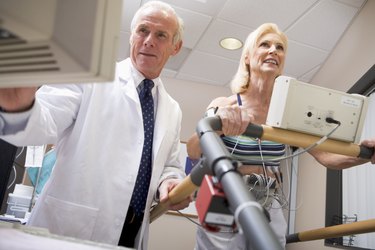
Though you don't have to study for a stress test, you should prepare your body as much as possible. A stress test is used to evaluate the mechanics and functionality of your heart. Caffeine can potentially alter the picture your doctor is looking for and for this reason it should be avoided for approximately 24 hours before your test. You should be aware that caffeine can be found in more than just coffee, soda or tea. Other commonly used items include chocolate products, energy drinks and many ibuprofen based medications.
Increased Blood Pressure
Video of the Day
Caffeine is used as a stimulant often used to increase energy and mental stimulation. However, caffeine can cause dehydration and diarrhea, both of which will lead to a high blood pressure. In addition, caffeine constricts the arteries in the body which makes the heart work harder, thus increasing blood pressure. One main marker of blood pressure is total peripheral resistance around the heart, which includes the state of the arteries. Constricted arteries means greater total peripheral resistance which leads to a higher blood pressure.
Video of the Day
Increased Heart Rate
According to the American College of Sports Medicine, caffeine can increase both your resting and exercising heart rate. There is no exact equation of how much your heart rate will be affected, as it will vary depending on person and frequency and amount of caffeine use. In addition to increasing the heart rate, it also increases the contractility of the heart. Increased rate and contractility makes the heart work harder, even at rest. Going into a stress test with a fatigued heart is counterproductive to the test.
Arrhythmias
A hard working heart means that there is an increased risk of developing an arrhythmia. Since caffeine is a stimulant and activates the central nervous system's innervation on the heart, there is risk of developing an arrhythmia. Such arrhthymias include ventricular ectopic beats and paroxysmal atrial tachycardia. Ventricular ectopic beats occur when the ventricles spontaneously contract without prompting by the rest of the heart. Paroxysmal atrial tachycardia is a short run of very fast heart beats by the atrium. Either of these arrhythmia are cause for concern when participating in a stress test.
Is this an emergency? If you are experiencing serious medical symptoms, please see the National Library of Medicine’s list of signs you need emergency medical attention or call 911.